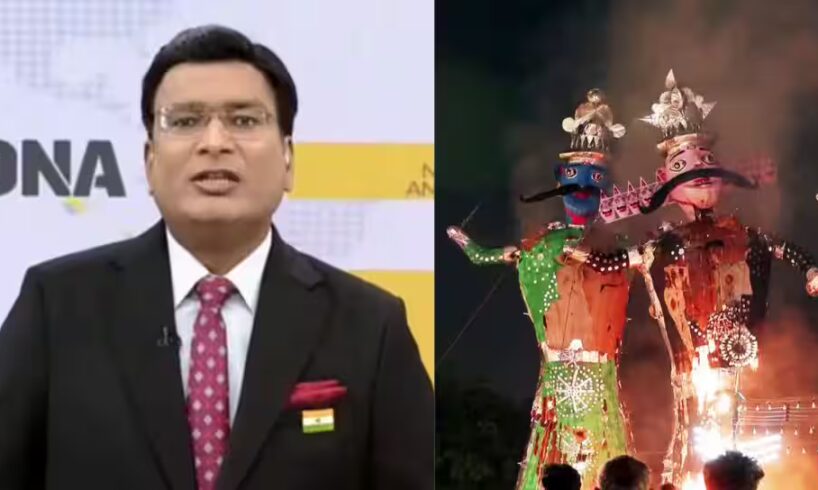
On the occasion of Vijayadashami, more commonly known as Dussehra, while the entire nation celebrates the grand festival marking the triumph of dharma over adharma, justice over injustice. Across India, effigies of Ravana are being burned as symbols of evil, while chants of victory for Lord Ram resonate everywhere. Yet, shockingly, in some parts of the country, posters of Lord Ram, regarded as the epitome of truth and dharma, are being set on fire.
One such incident was captured in Tamil Nadu’s Tiruchirappalli (Trichy), where an organization named Anthem Tamilar Sangam burned an effigy of Lord Ram, labeling it a “Ravana Leela.” Despite police awareness, the act was permitted under the guise of freedom of expression. This raises critical questions: Can insulting Lord Ram be justified as freedom of expression? Is it right to hurt the sentiments of millions of Hindus? By allowing such acts, are authorities not complicit in spreading hatred? Would similar acts against any other religion be met with silent consent?
In recent years, India has witnessed a rise in ideological animosity against Hinduism. Some groups, harboring a Ravana-like mindset, relentlessly target Hindu gods, symbols, festivals, and beliefs. Even political figures like Tamil Nadu Deputy Chief Minister Udhayanidhi Stalin have sparked controversy by equating Sanatan Dharma with diseases and calling for its end, yet no decisive action has followed, and he was even promoted.
Add Zee News as a Preferred Source
When those in power propagate anti-Hindu sentiments openly, it emboldens others to disrespect the Hindu faith, which police attribute to freedom of expression. However, constitutional boundaries clearly prohibit expressions that promote hatred or violence.
Tamil Nadu, home to nearly 88% Hindus, hosts numerous sacred temples and festivals, yet some people actively seek to weaken Hinduism and create divisions through acts of disrespect. Similar incidents have also surfaced in North India, such as in Mirzapur, Uttar Pradesh, where a woman named Saroj Sargam was arrested for derogatory comments against Goddess Durga during Navratri, after having converted to Christianity but continuing provocations via videos.
There are countless examples where Hindu scriptures and deities are mocked or maligned, be it depicting Goddess Kali smoking or posting controversial images related to Shivling. Despite these provocations, Hindus have generally refrained from violent protests.
Unlike the widespread public unrest seen over relatively minor provocations like posters, which often leads to violence and disorder, the response when Hindu beliefs are attacked tends to be limited to filing FIRs. This restrained reaction may be misconstrued as weakness, potentially encouraging repeated assaults on the Hindu faith and sentiments.
Hinduism, a religion thousands of years old with about 1.2 billion followers globally, has never forced itself on others. History shows it endured many invasions without waging wars to spread itself, respecting the choices of belief. Sadly, some exploit this for mockery and insult, hiding behind democracy and freedom of expression.
Some openly burn Lord Ram’s effigies as sacrilege, while others perpetuate adharma under the guise of Ramleela performances. Traditionally, Ramleela enacts episodes from Lord Ram’s life, from birth to coronation. However, in recent years, some Ramleela committees have diluted its sanctity by introducing vulgarity, Bollywood songs, and film-style dialogues to garner audiences. Such distortion harms religious sentiment and sets a dangerous precedent.
A glaring example was when Poonam Pandey, a figure accused of promoting obscenity, was offered the role of Mandodari, Ravana’s righteous wife, in a Delhi Ramleela, which was reversed only after public outcry. This trend is worrisome as children attend Ramleela to learn from Lord Ram’s virtues, but viewing obscene content could distort their perception of religion and morality.
Moreover, several places have started opposing Ravana’s effigy burning during Dussehra. In Vidisha district, Madhya Pradesh, there is a unique village where Ravana is worshipped as a deity with a temple and a 10-foot stone idol, celebrating him as a scholar and devotee of Lord Shiva. Yet, even here, Ravana’s negative traits, arrogance, pride, and misuse of power are acknowledged.
ALSO READ: Jammu And Kashmir Witnesses Large-Scale Dussehra Celebration After Decades





